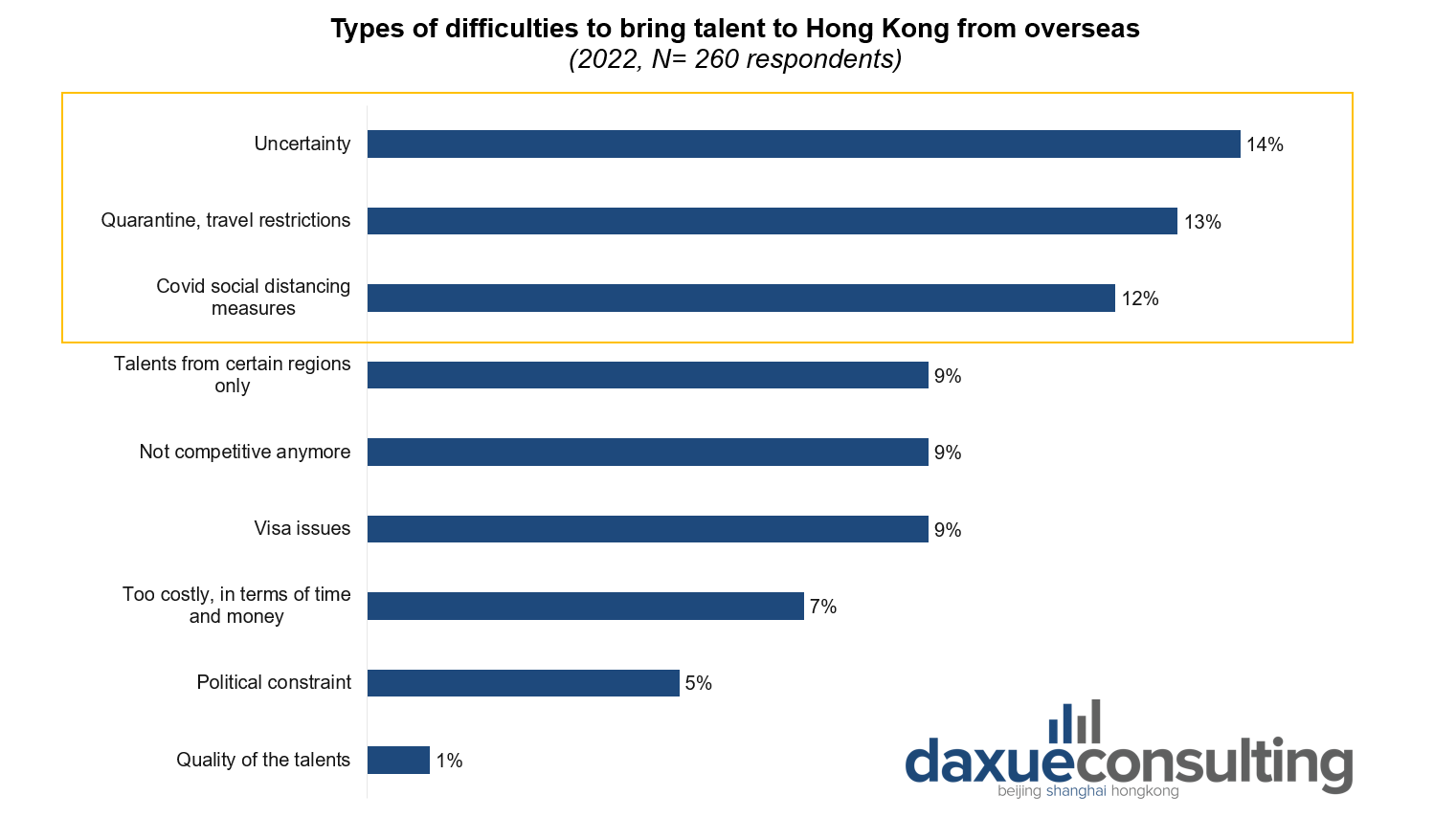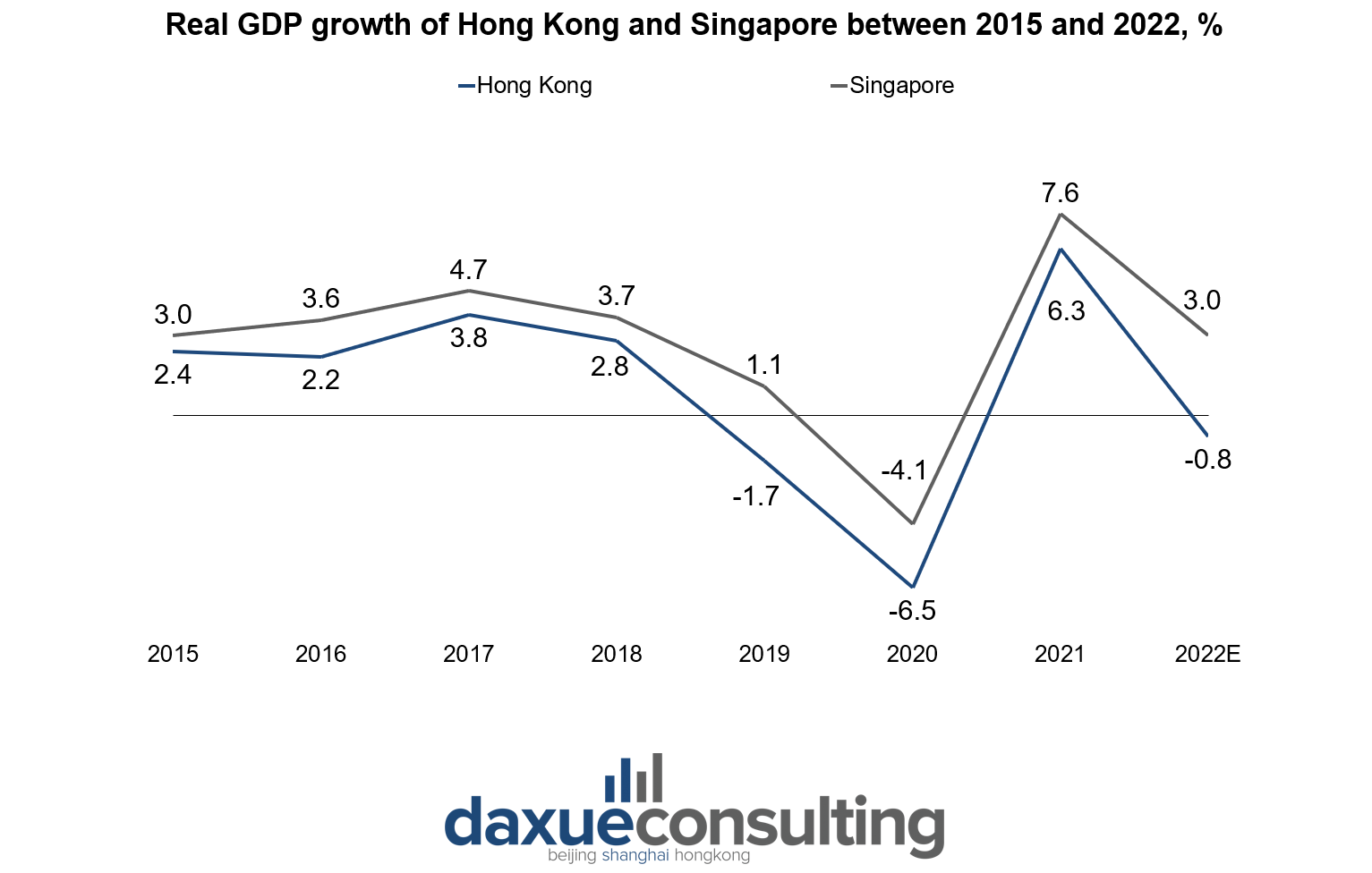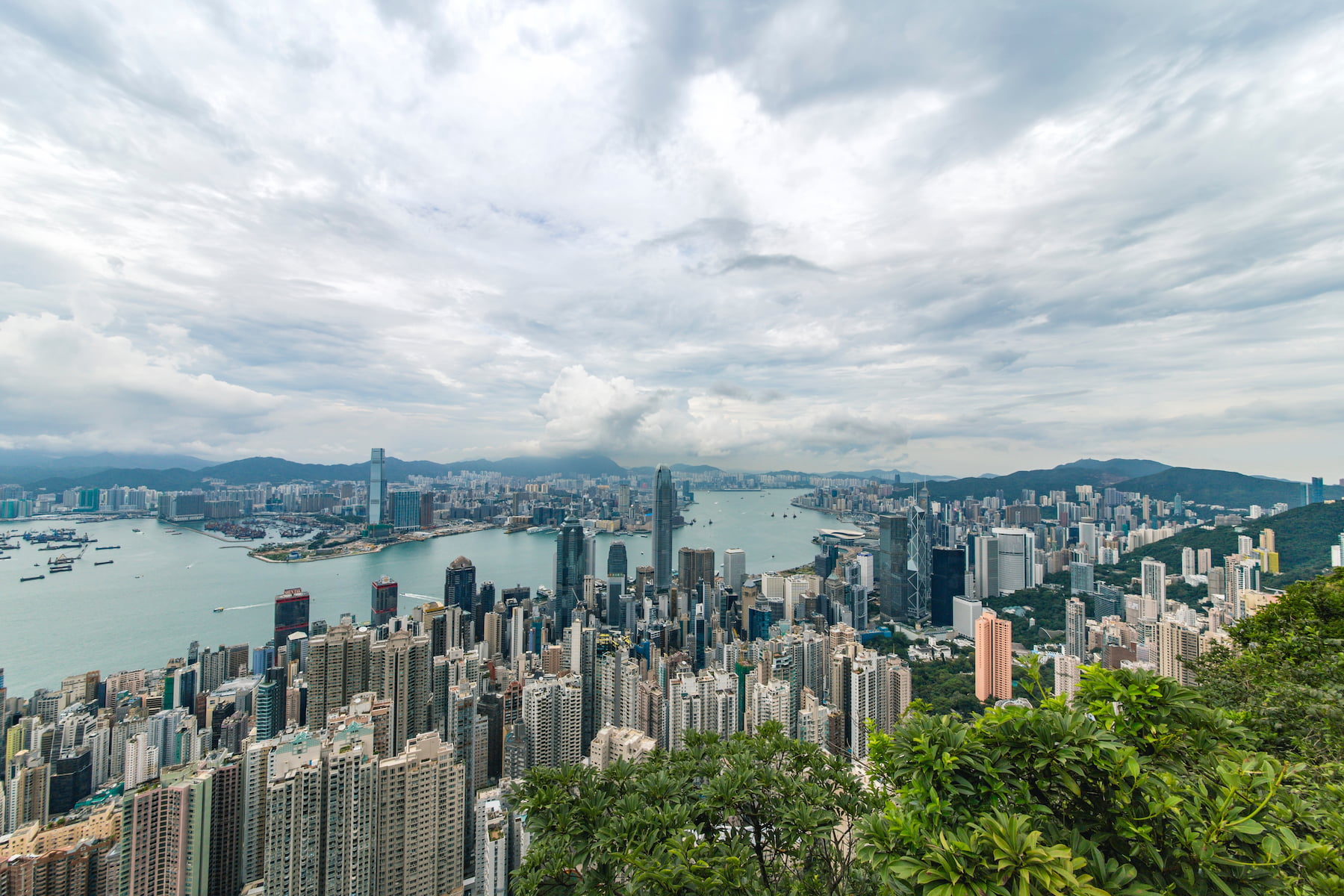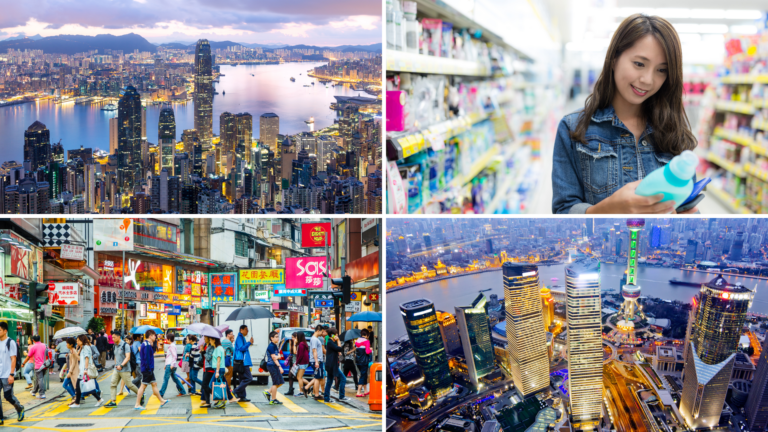Singapore and Hong Kong are historical economic competitors: a few decades have passed since the beginning of their fast growth as financial centers. Their success is indisputable, and their growth strategies have served as models for the worldwide community. In 2019, Singapore and Hong Kong ranked as the second and third easiest places to do business in the world. Both cities are popular locations for regional headquarters of international companies, offering numerous benefits for businesses, like a friendly tax system, easy company registration processes, open immigration policies, and transparent regulations. Setting up a company in Hong Kong is still a prospective decision. The two cities are also huge international travel connections, with Hong Kong giving direct access to mainland China and Singapore serving as a connection to Southeast Asia.
However, the past few years have posed dangers to both markets. Even before 2020, both cities were experiencing declining economic growth and were later hit by the pandemic. Hong Kong was already going through uneasy times and losing trust of some investors and companies, and Singapore’s exports were declining. The arrival of Covid-19 and numerous lockdowns put even more pressure on the two cities. Foreign companies started leaving Hong Kong earlier, but the latest events pushed even more of them to relocate. Due to the Zero-Covid policy, the Chinese market grew slower than expected and business travels were restricted during the lockdowns, and international connections were also disrupted. Additionally, the city faced difficult political changes as well as another competitor — Shanghai growing by its side. Hong Kong encountered multiple problems that put its development in danger, and Singapore started attracting more companies.
The pandemic scares workers away
At the moment, Hong Kong is still struggling to overcome the pandemic and its consequences. Covid policies have not yet been removed. They are the biggest obstacle for companies operating in the city and the major driver for foreign companies leaving Hong Kong. Masks are still mandatory in indoor public areas and passengers arriving from abroad must test multiple times and potentially undergo quarantine. Even more disturbing measures remain, like the obligation to wear a wristband for infected people undergoing home isolation. However, although restrictions are still in force, they show a positive improvement. The measures are easing after the central government allowed their relaxation.
The anti-Covid policies indeed prove to be the biggest disturbance to expats: according to the European Chamber’s report, one in three firms said that more than 25% of their staff consider leaving the city due to quarantine restrictions. Out of those who already left, more than half based their decision on anti-pandemic measures. Another 9% cited the city as not being as competitive, 7% considered it being too costly. 14% believe the procedures to come being too time-consuming and difficult. This shows Hong Kong’s deteriorating popularity and illustrates the main reasons of foreign companies leaving Hong Kong, as well as the specific problems that expats face in the city today. Indeed, the market has experienced another significant drop even after an improvement in 2021. International workers are less willing to relocate to Hong Kong: even schools are experiencing troubles hiring teachers despite high wages offered.

Are companies leaving Hong Kong?
As a result of the declining attractiveness of the city, demographic changes are happening. In only 2022, the city’s population was reduced by 113,000, which included both expats and locals. From 2020 to 2021, the number of regional headquarters has decreased from 1,504 to 1,457, which placed their number at a five-year low. A significant number of foreign companies are leaving Hong Kong: almost half of European firms are planning to relocate fully or partially within the next twelve months. Investors worry about the lack of a clear outlook for the future.
A number of prominent foreign companies are leaving Hong Kong. VF Corporation (VFC), the owner of North Face, Timberland, and Vans, is leaving the city and relocating their regional management to Singapore due to stronger business infrastructure. L’Oréal is reducing its presence too, and restructuring to Singapore due to their growing interest in working with the Southeast Asian, Middle Eastern and North African markets. Naver, a South Korean search engine, announced it was moving backup servers to Singapore, citing safety as a reason.
However, not all foreign companies are leaving Hong Kong and losing faith in the city’s future. Financial firms express hope and certainty that Hong Kong’s role as a financial hub will not deteriorate. For example, HSBC Holdings is not willing to leave or relocate. On the contrary, it announced the investment of another 6 billion USD in its business there, saying that the city remains its most lucrative market.
Why Singapore is attracting more companies
Businesses are choosing Singapore due to its friendly economic situation and brighter perspectives of growth. In 2022, Singapore increased its GDP by 3%, while Hong Kong’s GDP declined by 0.8%. In addition, it ranked 107th worldwide by quality of life, while Hong Kong was 211th. Singapore also placed 3d among the world’s most competitive economies, leaving Hong Kong behind at the 5th place. Singapore has also had historically better social policies aimed at better accommodation of foreigners, because the country is originally composed of a very multinational population.
Most importantly, Singapore has also relaxed its anti-Covid measures: even unvaccinated travelers are not required to test before entering the country, and masks are only obligatory in healthcare facilities and on public transport, which makes life of both locals and visitors much easier. This boosts the possibility of business travels and gives more certainty in the future policies, because there is no external control over the restrictions. Reports mentioned above show that this aspect is of big importance to those deciding whether to stay or leave Hong Kong.
Even though Singapore is attracting more companies, comparing the real GDP growth of the two cities shows a small difference between them and a similar dynamic. The cities’ development experienced similar trends in the past years, except for a larger difference in 2022. It suggests that the biggest issue for Hong Kong is the problematic anti-covid policy which seems to negatively affect individuals, businesses, and the economy overall.

Hong Kong has the potential to regain its strength
There are many reasons to be optimistic about the future of Hong Kong’s market. The city is indeed weaker than Singapore in major economic reports. However, the Chinese city is following its rival closely behind. The main factor causing the difference between them appears to be the different approach to fighting the pandemic. In this regard, improvements are seen in Hong Kong. Anti-Covid measures have been easing: the government lifted compulsory quarantine for arriving passengers and softened mask requirements. The possibility of the Zero-Covid policy being canceled gives hope to people already living in the city and to those arriving there.
The city is also willingly helping its businesses. The government is enacting funding schemes and subsidizing companies and workers with 27 billion HKD to help them recover from the pandemic. Additionally, rent prices are falling, which could also attract more high-skilled workers to stay or return. Officials say that companies located in the city have been tending to downsize due to the effects of the pandemic, but most businesses are not leaving. As a response to those foreign organizations that have left, the number of mainland companies is growing and more and more of them are investing into the city, proving their trust in its future.
Indeed, all these developments give hope that Hong Kong will soon return to being a prosperous and internationally attractive financial hub. Even though Singapore may seem to be a less risky destination at the moment, the two rivals have not yet drifted too far apart. The latest trends in Hong Kong show its potential in reviving. Its essential characteristic of being the door to the Chinese market will remain unchangeable and thus always attractive for businesses.
Hong Kong and Singapore battle to attract industry leaders
- Hong Kong is still dealing with the pandemic, and the Zero-Covid policy pushes many international workers and locals out of the city.
- Numerous companies are considering relocating to Singapore due to its more stable social and economic environment.
- Examination of statistics shows that Hong Kong and Singapore do not differ significantly.
- Hong Kong shows positive trends in fighting the pandemic and attracting companies back, which gives it a promising future.
Author: Sofia Tishchenko





